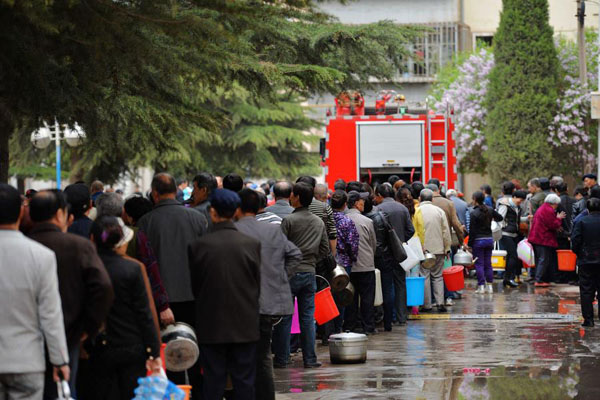Lanzhou rids pollutants off water in 2 districts
 0 Comment(s)
0 Comment(s) Print
Print E-mail Xinhua, April 13, 2014
E-mail Xinhua, April 13, 2014
Lanzhou city in northwest China's Gansu province cancelled emergency water supply to two districts at 6 p. m., as the contaminated tap water was found safe there, local government said Saturday.
| Residents queue up to get safe water supplied by the government in Lanzhou, Gansu province on Friday after the city's tap water was found to be polluted by benzene, a toxic cancer-causing chemical. [Photo/Xinhua] |
Crude oil leak from a petrochemical pipeline poisoned the water source for a local water plant and brought hazardous levels of benzene into the city's tap water on Friday morning, affecting 2.4 million people.
The city government warned residents not to drink the tap water for 24 hours until 11 a.m. Saturday.
By 11 a.m. Saturday, the environmental monitoring department found no more benzene in four tests of samples taken from two downtown surveillance sites in Chengguan and Qilihe districts. The city government thus decided to stop emergency supply of free drinking water to the two districts.
At Anning district, the benzene level dropped from 6.66 micrograms to 1.64 micrograms per liter since 9 a.m. Saturday. China's national limit for benzene in tap water is 10 micrograms per liter.
The government said it would stop emergency water supply and dispatch of free bottled water to the district if the benzene level maintained safe by 8 p.m..
Traces of benzene, however, were still found in water samples taken in Xigu district, and the government suggested people not to drink the tap water.
Lanzhou's water works continually washed the filter system to flush out the pollutant on Friday night, and kept water cycling to cleanse the pipeline.
The tap water contamination caused panic on Friday. Stores and supermarkets ran out of bottled water, and many people complained of thirst.
Fire engines and water sprinklers carried water to downtown communities for emergency supplies, and residents fetched water with pots, basins and buckets until after midnight.
From Thursday evening to early Friday morning, Veolia Water, a Sino-French joint venture and the sole water supplier for urban Lanzhou, found between 118 micrograms and 200 micrograms of benzene per liter at their plants.
Benzene is a colorless carcinogenic compound used to manufacture plastics. Benzene is known to damage the human hematopoietic system, which produces blood.







Go to Forum >>0 Comment(s)